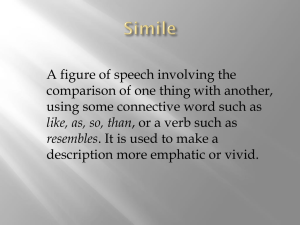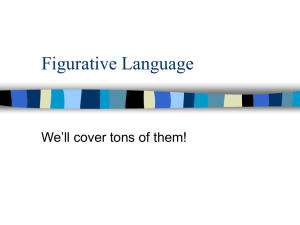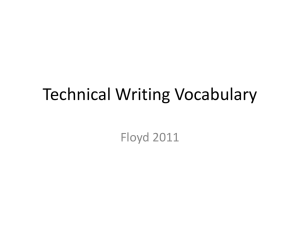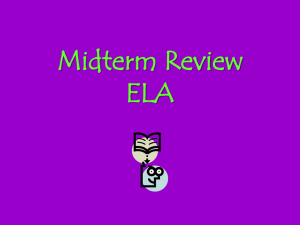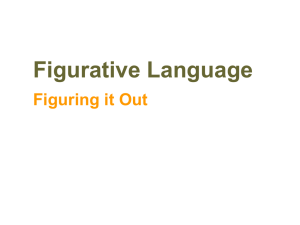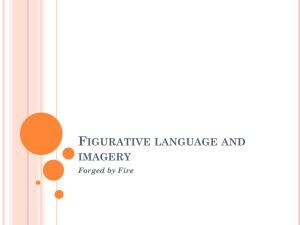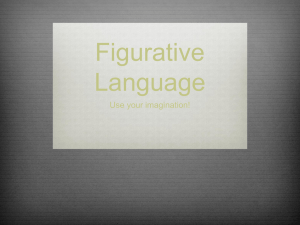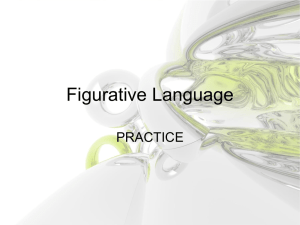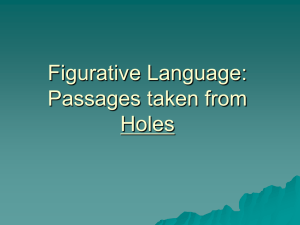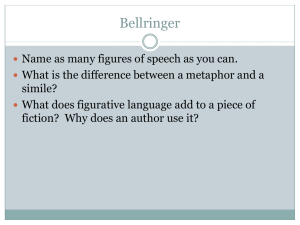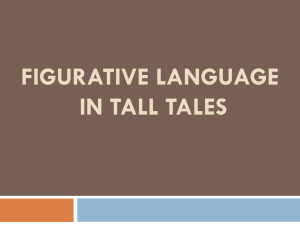Figurative Language
advertisement
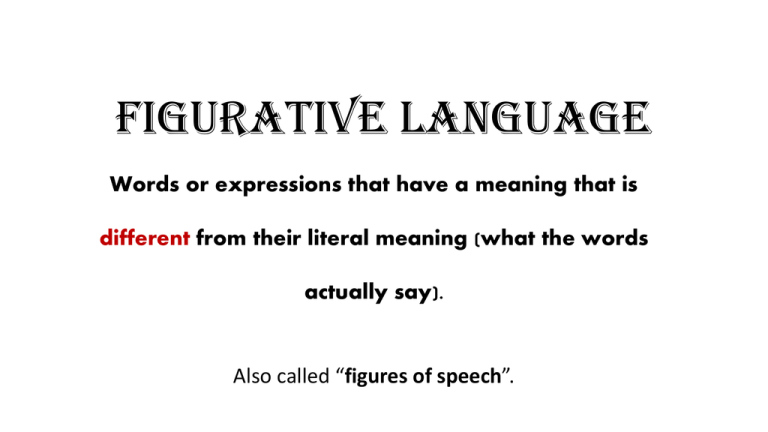
Figurative Language Words or expressions that have a meaning that is different from their literal meaning (what the words actually say). Also called “figures of speech”. 6 Types of Figurative Language Simile Metaphor Personification Hyperbole Alliteration Onomatopoeia 1. Simile A comparison of two UNLIKE things using the words “like” or “as”. Example: Uncle Edgar and Aunt Agatha ate like hungry bears. 2. Metaphor A comparison of two unlike things, this time WITHOUT using the words “like” or “as”. A metaphor says one thing IS another. Look for linking verbs, such as am is was were Example: Uncle Edgar and Aunt Agatha were hungry bears. 3. Personification A figure of speech that gives human qualities, characteristics, or actions to non-living things. Example: A cozy fire called to Uncle Edgar and Aunt Agatha from the living room. A fire cannot “call” to anyone. 4. Hyperbole A deliberate exaggeration that is used to for emphasis or to be humorous, and cannot possibly be true. Example: Uncle Edgar and Aunt Agatha nearly laughed their heads off! 5. Alliteration An repetition of an initial consonant sound in neighboring words. REMINDER: consonants are all letters except a, e, i, o, u, and y. Uncle Edgar and Aunt Agatha add cheerful chatter to the conversation. Why isn’t “Aunt Agatha add” considered to be alliteration? Can you figure out WHY NOT? cheerful chatter is an example of alliteration because the ch sound is repeated. 6. Onomatopoeia Words that imitate the sound they refer to. Example: A blaring Beep! Beep! from the driveway announced that Uncle Edgar and Aunt Agatha had arrived. Beep! Beep! imitates the sound of the car’s horn. PRACTICE Can you tell which type of figurative language is being used? 1. Everyone bustled around like a well-coached team, helping to clear the dining room table and put away the leftovers. a. alliteration b. metaphor c. simile d. hyperbole e. personification The kitchen was a symphony hall of clanking and banging eating utensils and dishes being placed in the dishwasher. 2. What two figures of speech are underlined above? a. Alliteration and simile b. Metaphor and hyperbole c. Personification and alliteration d. Metaphor and onomatopoeia e. Alliteration and hyperbole Leftovers, placed in containers, rested on refrigerator shelves awaiting a second call to action later in the evening. 3. Which type of figurative language is used above? a. simile b. metaphor c. personification d. hyperbole e. onomatopoeia After dinner, it was game time and the men sat on the couch, tilted forward like bits of metal being pulled like a magnet. 4. What type of figurative language is used? a. simile b. metaphor c. personification d. alliteration 5. What does the figure of speech suggest? a. b. c. d. The men couldn’t see the screen The men were eager for the game to begin The men were uncomfortable The men had poor posture At half-time, Jenny went to her room, grabbed her purple plastic pom-poms, and proceeded to prance around the room. 6. What figure of speech is used in the sentence above? a. Onomatopoeia b. Simile c. Metaphor d. Alliteration e. Personification “You,” Mom said to Jackson as she handed him the last piece of pie, “are a human vacuum cleaner!” 7. Mom’s characterization of Jackson’s appetite is an example of A. B. C. D. a simile a metaphor a hyperbole personification
